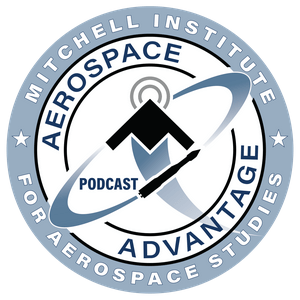Episode 230 — F-47 Insights, Chinese “Dog Fighting in Space,” and DC Defense Developments: The Rendezvous
Episode Summary:
In this Rendezvous episode, we discuss top Air Force and Space Force developments in Washington, D.C., and beyond.
We review key themes from Chief of Space Operations Gen. B. Chance Saltzman's visit with the Mitchell Institute last week, as well as a broad range of spacepower topics, from Chinese “dogfighting” in space to the new lunar landing to new launch contracts and the future of Space Development Agency contracts. On the Air Force side, we discuss how the recent F-47 NGAD announcement will shape the future of airpower and how that program could impact the service's Collaborative Combat Aircraft, F-35, and B-21 programs, and more.
Credits:
Host: Heather “Lucky” Penney, Director of Research, The Mitchell Institute for Aerospace Studies
Producer: Shane Thin
Executive Producer: Douglas Birkey
Guest: Brig Gen Houston "Slider" Cantwell, USAF (Ret.), Senior Resident Fellow, The Mitchell Institute for Aerospace Studies
Guest: Charles Galbreath, Senior Resident Fellow for Space Studies, The Mitchell Institute Spacepower Advantage Center of Excellence (MI-SPACE)
Guest: Todd “Sledge” Harmer, Senior Vice President, American Defense International
Guest: Anthony “Lazer” Lazarski, Principal, Cornerstone Government Affairs
Links:
Subscribe to our Youtube Channel: https://bit.ly/3GbA5Of
Website: https://mitchellaerospacepower.org/
Twitter: https://twitter.com/MitchellStudies
Facebook: https://www.facebook.com/Mitchell.Institute.Aerospace
LinkedIn: https://bit.ly/3nzBisb
Instagram: https://www.instagram.com/mitchellstudies/
#MitchellStudies #AerospaceAdvantage #Rendezvous #CapitolHill
Thank you for your continued support!
